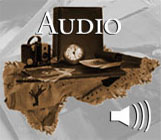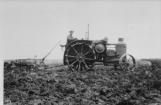14
The land was broke by plow usually in the spring when the soil was moist. Four to six inches of prairie sod were rolled upside down in order to kill the grass. Later, crops such as wheat, barley, oats, and flax were sown.17
PlowingOctober, 1987
A field near Avonlea, Saskatchewan, Canada
 Credits:
Credits:Mabel Watson
Lawrence Watson
18
Lawrence: What are you studying in the [Arrowheads to Wheatfields] book, today?Mabel: Well we're just talking about hauling grain and I said a lot of children learned to work early when they were your age.
Lawrence: Yes, I think Harold and I were hauling grain in 1927 or 8
Mabel: Not 20... 30
Lawrence: I quit school in [19]32.....
Mabel: [reads from "Arrowheads to Wheatfields"] Here Harold's got, "At the age of nine, along with my brother Lawrence and a neighbour-girl Margerite Thrower, I recall making two trips a day to Avonlea hauling grain. In [19]29, Dad and Grandma Watson bought a half-section of school land. In order to break the land, Dad bought a 15 Caterpillar Tractor. Lawrence and I sat on the seat; he drove the tractor and I tripped the plow.
Lawrence: Yes, we broke..., I'd be 12 years old, Harold and I broke a half section in 1929 and 1930. We were both small enough to sit in the seat of the Caterpillar Tractor, if you can imagine that.
Mabel: [reads from "Arrowheads to Wheatfields"] Harold said, "I took my high school in Avonlea, staying with my Grandma Miller. She boarded many of her grandchildren so they could further their education. I left school in [19]35 and I've farmed ever since. [19]37, due to the drought, the crops didn't germinate, so along with several others I went to Manitoba. We made two dollars per day just stooking and if we were lucky, two and a quarter to thresh.

